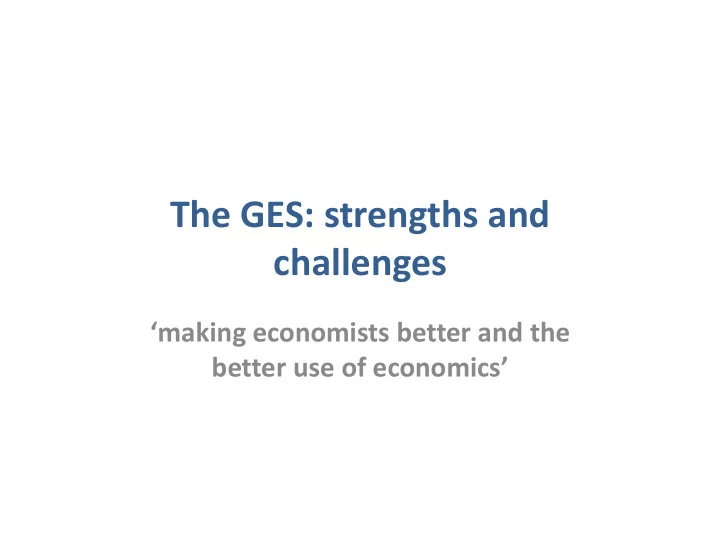

The GES: strengths and challenges ‘making economists better and the better use of economics’
Agenda 1. About us 2. Introduction to the UK’s Government Economic Service (GES) a) Entry requirements b) Hierarchy c) Appraisal and promotion d) Economists across Whitehall 3. Successes 4. Challenges
1. About us
Our background • Department for Business Innovation and Skills, Economics and Markets Group (led by Samantha Neil Beckett, Deputy Head of GES) • Lead a flexible team of economists Golborne • Joined GES in 1992 worked in 5 departments • BA, Essex University; MSc Warwick University • HM Treasury • Head of GDP, Economics Group (led by Dave Ramsden, Felicity Head of GES) • Internal and external analytical experience Hannon • MPhil Economics, Cambridge University
2. Introduction to GES
a. GES requires an extra assessment Fast Economic Universit Online Fast stream Assessment Assessment y tests streamer Centre (FSAC) Centre (EAC) • 2.1 Degree or • Verbal • Interview • Group • Typically 2 Masters reasoning discussion roles for 18 • Technical months • Economics • Numeracy assessment • Policy review • 10 short Qs • Opportunity to re-sit • Presentation • As well as the normal steps of the Fast Stream application process, applicants for have to pass an extra assessment called EAC. • Annual intake typically 200 selected from around 1300 applications. • If you’re successful at the EAC but not the FSAC, there may be the possibility of a provisional temporary appointment.
b. GES Hierarchy • Economists have same grading Grade Manages up to structure as policy professionals 3/SCS PB2 100 analysts within each Department. Manages up to Grade 20/30 analysts 5/SCS PB1 • But to reach highest grades in Civil Service (DG, Permanent Manages up to Secretary), need to switch to Grade 6 8 analysts policy role. Manages one/two fast Grade 7 streamer(s) • There is some variation across departments (grading and Fast- salaries). streamer
c. Performance is assessed against objectives and behaviors… Appraisal Promotion • Every civil servant is graded 1, • Promotion at all levels is 2 or 3 at mid year and end competitive and competition year. Marking depends on varies by role – it is not related performance against objectives to time in post. and behaviors (including soft skills). • Application and interviews, sometimes psychometric • End year box marking testing. determines size of pay rise. • Interviewing panel assess • 360 degree feedback whether applicant displays the competencies required of the next grade up. • Appraisal is also used to identify development needs
d. All Departments have an economics capability led by a Chief Economist Total • Size of economics teams Total core Economists/ Department economists staff core staff varies according to size of HM Treasury 136 1,220 11% department and balance Health 67 1,920 3% Energy and Climate Change between 93 1,570 6% Education 22 2,290 1% policy/implementation. International Development 116 1,900 6% Transport 79 1,850 4% • Budget holders in Business, Innovation and Skills 128 3,080 4% Departments (e.g. DGs) Communities and Local Government 32 1,680 2% decide how many Justice 55 4,220 1% Culture, Media and Sport 7 390 2% economists they need. Environment, Farming and Rural Affairs 65 2,070 3% • Chief Economists meet Cabinet Office 21 2,030 1% Foreign and regularly to discuss Commonwealth Office 36 4,610 1% professional issues, Home Office 24 23,520 0% Work and Pensions 91 95,920 0% chaired by Dave Ramsden HM Revenue & Customs 56 69,310 0% Defence 18 48,540 0% and/or Sam Beckett. Notes:some departments include implementation staff in core (e.g. tax and benefit inspectors); figures correct as of January 2014; excludes government economists working in agencies
3. Successes
Successes: Increasing demand and high impact analysis 2. GES is over represented in 1. Growing demand for analysis Senior Civil Service: 5 current has translated into increased permanent secretaries started demand for economists their careers in the GES 3. High impact analysis: Euro five economic tests; analysis relating to Scottish independence and EU membership; and public sector efficiency.
What contributes to GES success…? • Robust challenge from HM Treasury – “where is your evidence?” • Appraisal and evaluation frameworks (Green Book) which shape policy making process. • Championed institutions that have increased influence (e.g. better regulation). • Highly independent media. • Links with a strong, independent, research base (e.g. Universities). • Locating SCS led analyst teams in policy led directorates helps build relationships with policy teams. • Our ‘federal model’ allows economists to specialise while also getting cross-government support.
4. Challenges
Limited resources Faced with limited budgets, there is pressure on leaders to manage change, deliver their objectives, improve systems and release resources to other teams that are working on Ministerial priorities. Note: DEL stands for Departmental Expenditure Limit
Ensuring quality • Complex policy problems; IT enables more powerful analytical tools and access to larger datasets. • How do you manage analytical complexity? – Assurance: Implementation of the Macpherson review requires all business critical models to be Quality Assured. – Being Relevant: Drawing on larger and non- traditional data sources (e.g. credit card companies); data linking and new approaches (e.g. behavioral economics).
Any Questions?
Recommend
More recommend